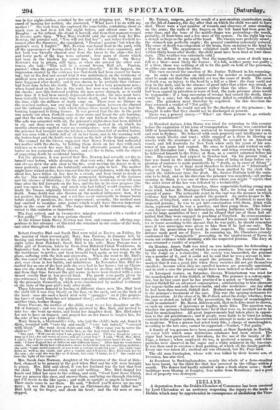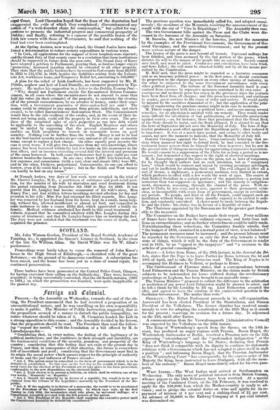IRELAND,
A deputation from the Dublin Chamber of Commerce has been received by Lord Clarendon at an audience respecting the injury to the trade of Dublin which may be apprehended in consequence of abolishing the Vice-
regal Court. Lord Clarendon hoped that the fears of the deputation had exaggerated the evils of which they complained; discountenanced any notion of a well-founded claim for compensation," but called for sug- gestions to promote the industrial progress and commercial prosperity of Dublin ; and finally, referring to a rumour of the possible fusion of the Irish law courts with those of Westminster, he said that nothing of the kind had ever been contemplated.
At the Spriag Assizes, now nearly closed, the Grand Juries have mani- fested a determination to reduce county expenditure in various ways.
" In Cork, all applications for the support of fever hospitals were rejected ; and the Grand Jury of that county came to a resolution that those institutions should be supported in future from the poor-rate. The Grand Jury of Kerry have adopted a petition to Parliament, praying that, as land no longer enjoys ,proteetione increased twestion should be extended to all other property. They state that the public burdens have increased in that county from 36,9511. in 1835 to 155,4781. in 1849, besides the liabilities arising from the La.bour- rate Act, workhouse loans, and Temporary Relief Act, amounting to 320,0001."
A plan for the relief of Irish landlords, has been suggested by Mr. H. Prittie, nephew and heir of Lord banally, an extensive proprietor in Tip-
Pe He makes his suggestion in a letter to the Dublin Evening Post— "Why should net Parliament enable the Encumbered Estates Commis- sioners, in all eases where the encumbrances do not amount to more than half the value (in their estimate) of the property, to undertake the clearing off of the present eneumbrances, by an advance of money, under their sanc- tion, with a Government guarantee of three-and-a-half per cent ? The money eould be obtained to any amount from private individuals, and stock created, to be called Encumbrances' Redemption Stock. The Commissioners would then be the sole creditors of the estates, and, in the event of their in- terest not being paid, could sell the property in their own court. The pro- duce of the occasional sales of such properties as ran into debt would be applicable to the cancelling of the stock. English Members and others may be misled by supposing that the present abundance of money enables an Irish proprietor to borrow on reasonable terms on good seenrity. Nothing can be further from the truth. Money is not to be had on the best landed security under six per cent, and not at all on any endurable terms except to replace a first charge. On other equally good security the case is even worse. I will give two instances ftom my own knowledge, where money has been borrowed within the last few weeks on life-insurances in the best offices, and on incomes exceeding several fold the interest and premium of the sums borrowed. In both cases the borrower-had to pay eight per cent interest besides the insurance. In one ease, where 1,200/. was borrowed, the law expenses and commission (with a very clear and simple title) were 80e, and m the other, I believe, proportional. Consequently, no one can afford to borrow, even if ho could funt a lender; but in. the South and West money can hardly be had on any terms."
At Nenagh Assizes, two days of last week were occupied in the trial of Mr. Charles Langley, M.D. a gentleman of substance and good social posi- time, for the murder of his wife by starvation and cruel treatment during the period extending from December 5th 1848 to May 1st 1849, It WWI proved that Dr. Langley had become enamoured of his wife's niece, Miss Nancy Poe; and had. written letters breathing devoted affection for her and aversion to his wife : Mille Poe had returned his illicit regards. Mrs. Lang- ley was removed by her husband from his house, kept in a small, mean lodg- ing, without fire, allowed insufficient or almost no food, and compelled in some instances to take a coarse filthy diet, which aggravated a bodily in- firmity. Medical evidence attributed her death to this cruet treatment. A witness. deposed that he committed adultery with Mrs. Langley during this course of treatment; and that Dr. Langley forgave him on learning the feet. The Jury were not satisfied that the treatment was the cause of death,. and acquitted the prisoner.



























 Previous page
Previous page